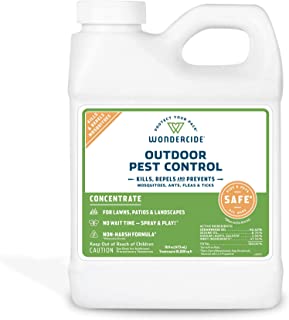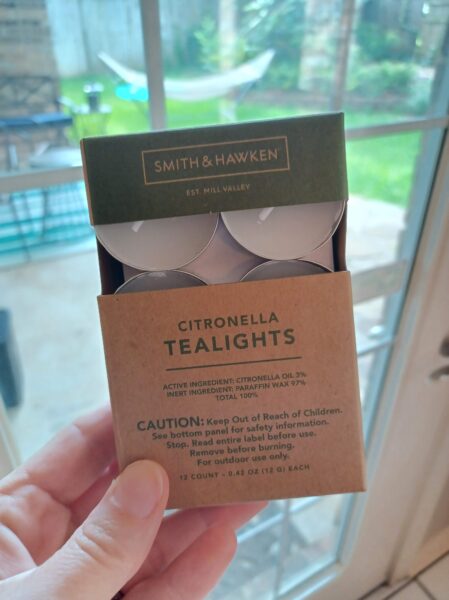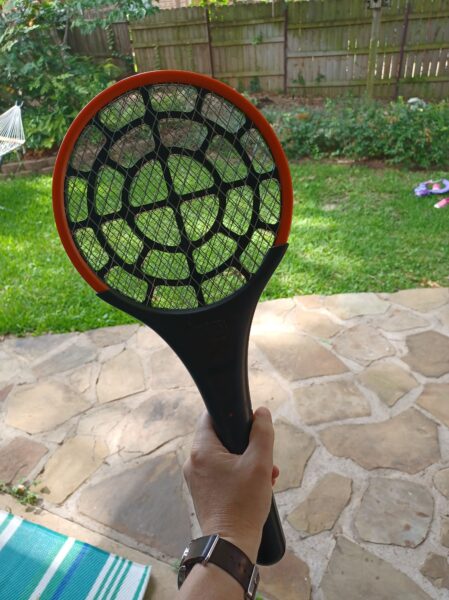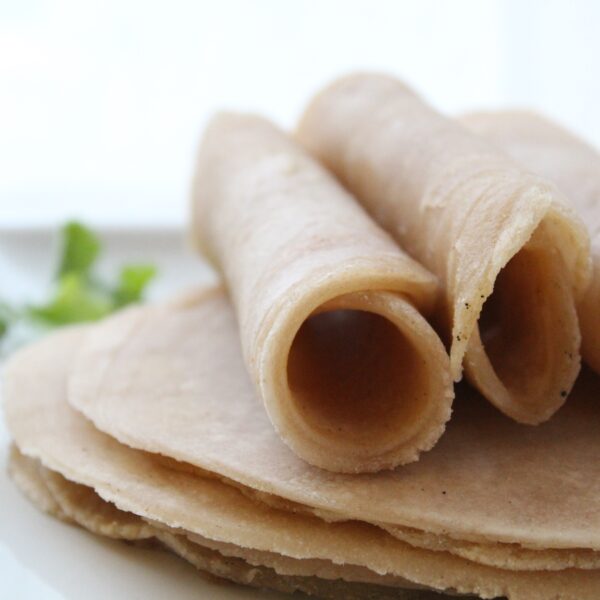How to Keep Mosquitos Away From Your Patio Naturally
Some of the links on this site may be affiliate links. This means, at no additional cost to you, I may be paid a small commission if you follow the links and make a purchase. Learn more here.
Looking to learn the best methods to keep mosquitos away from your patio (naturally) this summer? You’ve come to the right place.
Summertime is the best time of year, but it’s also the time when mosquitoes seem to be the worst. If you’re looking for ways to keep these pesky critters away from your patio, you’ve come to the right place!
Keep reading to learn about a bunch of natural methods you can try (we’ve personally used most of them).
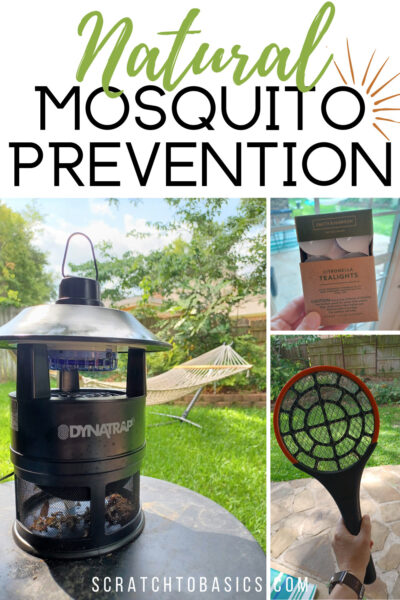
We recently moved to East Texas, and as anyone else who has spent a summer in mosquito country knows, these pests are more than just a nuisance–they can ruin a perfectly good evening on the back patio…fast.
If you’re hosting a barbecue or pool party, the last thing you want is for your guests to be constantly swatting at mosquitoes (and walking away with red itchy bumps all over).
Here are several natural methods to keep mosquitos away – including the [many] things we’ve personally tried.
Related Post: How to Keep Flies Away From Your Picnic
Store Bought Natural Mosquito Spray
This is by far the easiest method – buy a mosquito repellent spray that contains natural ingredients like citronella or lemongrass, and spritz away! This is the mosquito spray we use (pictured above).
Pros:
- You don’t have to do anything except buy the spray
- It’s (usually) very effective
Cons:
- It can be expensive if you go through it quickly
- You may not want to spray it around your food
Citronella Candles
Another easy method is to use citronella candles. You can find these at any store that sells outdoor supplies during mosquito season. Just light them and place them around your patio – they’ll help keep the mosquitos away, while giving you a nice candle-lit ambiance. I got the kind pictured above at Target.
Pros:
- They’re typically inexpensive
- Easy to find (any hardware store should have them)
- They smell nice (if you like the citronella smell)
Cons:
You have to remember to blow them out when you go inside
They need to be replaced frequently
Essential Oils to keep mosquitos away
One of the most common natural methods for keeping mosquitos away is to use essential oils.
There are several different essential oils that can be used, but some of the most effective include
- citronella oil
- eucalyptus oil
- lemongrass oil
- peppermint oil
- lavender oil
- lemon eucalyptus oil
You can purchase these oils online or at your local health food store. One note – make sure you’re using the good stuff (100% natural).
To use them, you have a few options…
- Simply add a few drops to an outdoor essential oil diffuser and place it near your patio area
- Create a homemade mosquito repellent. There are many different recipes out there for homemade mosquito repellents, but they all have a few things in common: water + witch hazel or vodka + essential oils.
- Add a few drops of oil to a spray bottle filled with water and spritz around your patio edges–just be sure to reapply every few hours for best results. **We keep a spray bottle out while the kids are swimming**.
Here are some pros and cons for using essential oils to deter mosquitos:
Pros:
- They’re natural and effective.
- You can find them at your local health food store or online.
- You can make a bunch of different scent varieties, depending on what you like.
Cons:
- Some people are allergic to certain scents so if you have any sensitivities, pay attention to that.
- They can be a bit pricey.
- If you use too many, they can be overwhelming.
Mosquito Repelling Plants
Another option is to plant mosquito-repelling plants.
Plants that repel mosquitos well are:
- lavender
- marigolds
- basil
- lemon balm
All of these plants have naturally occurring oils that will help keep mosquitoes away. Plant them around your patio directly in the ground, or in pots (for a less permanent solution).
Here are pros and cons for mosquito repelling plants:
Pros:
- They are natural and won’t harm you, your family, or pets
- They can make your patio smell (and look) nice
- If you plant them in the ground, they’re a permanent solution
Cons:
- You have to be careful about which plants you choose, as some of them can be toxic to pets
- You have to replant them every year (unless you plant perennial herbs)
- If you don’t like gardening, you might forget to water them…
Mosquito Nets
Another option for keeping mosquitoes at bay is to hang mosquito nets around your patio area. You can buy pre-made mosquito nets or make your own using netting material and some simple sewing skills.
Here are pros and cons for using mosquito nets:
Pros:
- They are effective at keeping mosquitoes away and can be used for other purposes like providing shade or privacy.
- Might be difficult to actually set them up (I’m envisioning ladders, nets, and tangles…)
Cons:
- They can be expensive
- They take up a lot of space
- You’re confined to the netted area, instead of being free to roam the yard.
Mosquito Traps
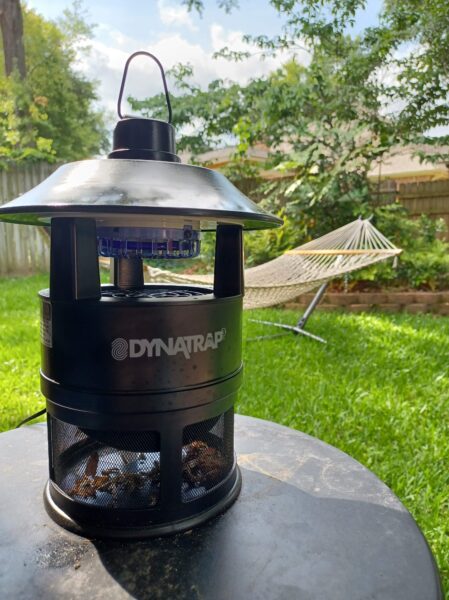
There are a number of different mosquito traps on the market that can be used to catch and kill mosquitoes.
Some of these work by luring mosquitoes in with a light or CO₂ and then trapping them inside the device where they die.
Other mosquito traps use a fan to suck the mosquitoes into a net or cage.
No matter which type of mosquito trap you choose, make sure to empty it regularly so that the dead mosquitoes don’t attract even more pests.
We recently got this one (pictured above) that has a light + CO2 and it traps bugs of all kinds, including mosquitos. This one covers 1/4 acre, but there are other models that cover more land, if needed.
Here are some pros and cons of mosquito traps:
Pros:
- You don’t have to constantly reapply lotion or spray
- They can work day and night
- You could use them indoors or outdoors
- Some people say they are more effective than mosquito repellent
Cons:
- You have to empty the trap regularly
- The light + CO₂ attracts not just mosquitoes but other flying insects as well
Bug Swatters
We recently bought a pair of electric bug swatters, and I’m super excited to keep them on the patio for any mosquitos that haven’t been trapped yet.
These things are seriously amazing. They look like tennis rackets and have a wire grid in the center.
When you turn them on, an electric current runs through the grid, so when you swat at a mosquito, it gets electrocuted.
Of course, this method only works if you’re quick enough to swat the mosquito before it flies away. Pro tip: when the mosquito lands on something, hover the wand over the mosquito and when it starts to fly away…ZAP!
And, as with any method that involves killing insects, there are some people who don’t love the idea of zapping mosquitoes. And the first time I did it, it jumped because there’s a loud ZAP noise, and you actually see the electricity as a spark.
If that’s you, try one of the other options…they work well too.
Here are some pros and cons for bug swatters.
Pros:
- They’re usually pretty cheap.
- You can keep them near your patio or anywhere else outside where you spend time.
- They don’t require any chemicals or other materials that could be harmful to the environment.
- Swatting is satisfying (to some people)
Cons:
- You have to be quick enough to swat the mosquito before it flies away.
- Some people don’t love the idea of zapping mosquitoes.
Summary: How to keep mosquitos away from your patio naturally
So, there you have it, friends. The next time you find yourself swatting at mosquitos, remember that there are SO many options to keep pesky mosquitos away from your patio this summer.
What’s the BEST approach for you? Well, that’s up to you.
Personally, we’re using a multi-faceted approach – a mosquito trap, bug swatters, essential oils AND we’ve got citronella candles on hand.
I plan to plant bug repelling plants, but I just haven’t quite gotten around to it yet.
What do you think? Do you have any other tips for how to keep mosquitoes away from your patio naturally this summer? Let me know in the comments below.
Don’t forget to save this for later on Pinterest


